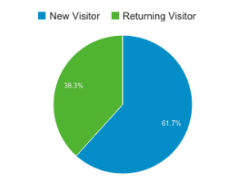5 SEO Metrics Small Businesses Should Prioritize written by Guest Post read more at Duct Tape Marketing

photo credit: Keyhole
It’s a problem almost every marketer has dealt with: opening their analytics suite to face a mind-boggling pool of stats, graphs, and figures.
Where do you start?
And which numbers should a small business track to get the most out of its investment in digital marketing?
Consider prioritizing these five search engine optimization (SEO) metrics to monitor and make decisions about your business’s online growth:
Organic Search Traffic
Any company looking to make a name for itself online should focus on this metric as it’s generally the highest source of web traffic.
Organic search accounts for 64% of all website visits, according to a 2014 Conductor study.
Depending on your industry, earning high search rankings can take anywhere from a few weeks to a few years. But since many small businesses target specific niches, you can quickly earn results by creating engaging content that uses relevant keywords.
Low organic search traffic can indicate you’re not:
- Optimizing certain areas of your site to improve user experience
- Writing page titles and meta descriptions that encourage users to click
- Targeting the right, or enough, keywords – your main audiences may not be finding you
- Sharing and interacting enough on social media – shares prompt search engines to index your content
Referral Traffic
Referral traffic is valued by almost all organizations, but it’s especially important for small business marketers. That’s because it shows if you’re meeting your key audience’s needs.
Since the metric is defined as visits to your website from sources other than searches, high referral traffic can mean:
- Other domains find your content valuable enough to link to
- Members of your target market are exchanging your content pieces or web pages
- There’s an audience on social media that follows links to your website because your products or services appeal to them
To boost referral traffic, actively promote your website and content beyond standard social media activity.
Reach out industry blogs, asking to guest post. Include a link to your website in your author bio. You should also pitch stories, or offer up the head of your business as an interview source, to news publications.
Bounce Rate
People bounce off your page when they’re not interested in what it says. Instead of interacting with your website, they close the window or hit the back button.
A high bounce rate hurts your SEO efforts because it:
- Means your page or post doesn’t meet the audience’s search intent
- Leads people towards competing websites, since you couldn’t meet their needs
- Shows your content isn’t encouraging users to explore and learn more about your business
So, how can you help this metric trend upward?
First off, search Google for the keyphrase one of your pages is targeting. You can see what your market wants to learn about based on the first set of results. Edit your content accordingly.
For good measure, include an enticing call-to-action (CTA) to guide visitors to another part of your website.
Visitor Growth
Visitor growth is a broad metric, but one that’s important for any business – it gives an overall picture of how your online presence is developing by tracking organic, non-organic and referral traffic.
Based on how this growth rate trends, you can set goals and take action to (a) prevent an anticipated drop or (b) increase a potential traffic boost.
You can also divide visitor growth into new and returning visitors.

photo credit: Keyhole
A hike in new visitors typically means you’ve earned more referrals and have written enticing headlines. An increase in returning visitors usually coincides with a low bounce rate, meaning your content is informative enough secure a dedicated audience.
Act quickly if your visitor rate is falling – it could mean you:
- Need to target different keywords
- Rely too heavily on one traffic source
- Create content that isn’t relevant or interesting
- Have a website that’s too difficult to navigate, discouraging return visits
Conversion Rate
Conversions may be the single most important SEO metric for small business marketers.
What’s the point in drawing people to your website if they don’t do anything meaningful once they’re on it? Plus, a lack of activity can make or break a sufficient marketing spend for companies with limited resources.
Set goals that coincide with your company’s overall business strategy to create conversion points on your website. If you need to increase leads, make a form for visitors to book a phone meeting.
Then, create content and paths on your website that point to it.
To keep conversions rising, try:
- Split-testing headlines and CTAs
- Including only the essential fields in forms, such as name and email address
- Adding clear incentives to complete the conversion, such as a discount price
- Having testimonials and other types of social proof that show the quality of your products or services
As you’re faced with an overwhelming amount of SEO metrics, think about prioritizing these five statistics when marketing a small business.
All key indicators of online performance, they should help you set realistic goals and track important benchmarks.
 Marcus Guido is a Content Marketing Specialist at Keyhole, a social media analytics software service that monitors trends and campaigns by tracking keywords and hashtags. Before joining, he worked at another software startup and two marketing agencies that served small- and medium-sized businesses. Follow him, and Keyhole, on Twitter: @keyholeco.
Marcus Guido is a Content Marketing Specialist at Keyhole, a social media analytics software service that monitors trends and campaigns by tracking keywords and hashtags. Before joining, he worked at another software startup and two marketing agencies that served small- and medium-sized businesses. Follow him, and Keyhole, on Twitter: @keyholeco.
from Blog – Duct Tape Marketing http://www.ducttapemarketing.com/blog/seo-metrics-small-businesses-prioritize/
via IFTTT
No comments:
Post a Comment